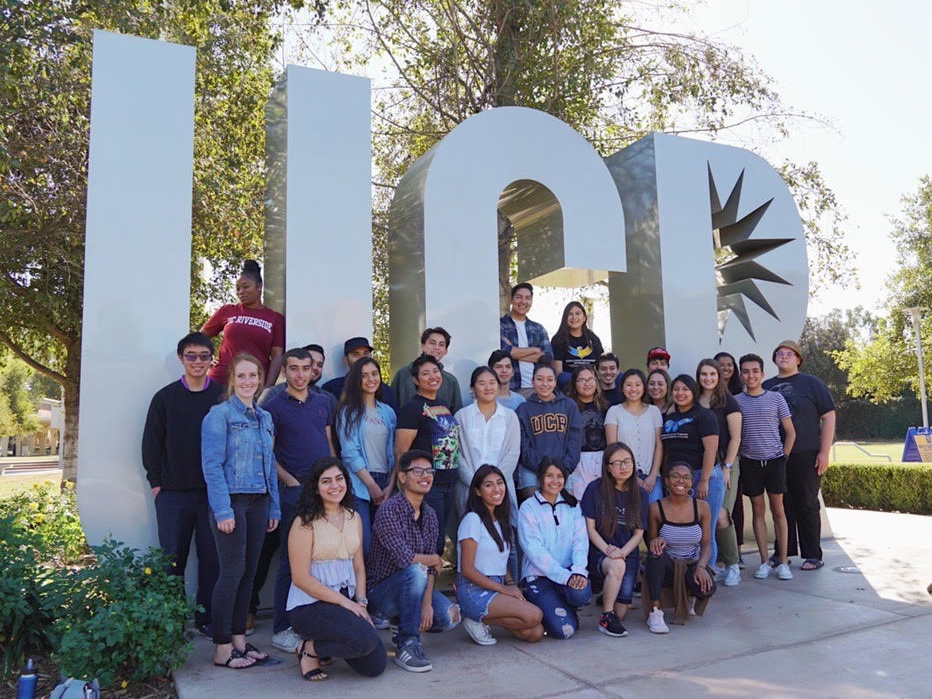
The Associated Students of UC Riverside (ASUCR) is composed of many different branches, committees and individuals that help the student government serve the campus population. One of the largest committees is Lobby Corps, which functions under the ASUCR Office of External Affairs; it is 1 of 4 committees that is overseen by the vice president of external affairs and focuses on community organizing and outreach to public officials in the Riverside community. According to second-year political science major Lizette Inzunza, who is the government relations director of the organization, Lobby Corps works to “engage UCR undergrad students in legislative advocacy, lobbying efforts and systemwide campaigns in order to address student and community systemwide issues and all the barriers we face on a local, state and national level.”
Inzunza continued explaining that Lobby Corps accomplishes this by “influencing our decision makers — from our campus admin to our elected officials… We collaborate with not just students on our campus but with legislative staffers and offices of the elected officials. We collaborate with higher education officials in community advocacy organizations and we launch campaigns. Once we identify an idea, we classify it within the campaigns.” Currently, the campaigns are: Fund the UC (which revolves around monetary investment in the university), Racial Justice Now, ACQUIRE (which is centered around basic needs) or UC We Vote (which is aimed at civic engagement across college campuses). Inzunza emphasized that the goals of these campaigns are all to “highlight the disparities because we are in a really unique position here at UCR. We have one of the lowest fundings but we also have one of the highest populations of students of color. We are more diverse than other UCs … we have a very unique experience than other students on other campuses.”
Lobby Corps is expansive — according to Inzunza in an interview with The Highlander, the organization has grown from 15 students when she joined the fall of her second year in 2018 to up to 90 regular committee members. Even this year, when the pandemic is impacting recruitment and retention, Inzunza has seen that number hold strong at about 60 regular committee members. “When there’s good news about the work we’ve done in years previous, people spread the work. They’re like ‘Yeah! I want to keep this momentum going and I want to keep these victories going so that we can improve the student experience for all.’” She continued to say that having a large staff and high student engagement is necessary, because there are so many student issues to tackle. “The more students there are involved the more momentum we can build and the more change we can create.”
Aside from regular committee members, Lobby Corps is composed of senior staff, coordinators and legislative staff that is overseen by the vice president of external affairs. Inzunza works as the chair of the committee and is responsible for leading the co-campus organizing directors, civic engagement director, local relations director, labor relations and more. As director of local relations, Andrea Terrones, a second-year political science major, is in charge of guiding any issues focused on community outreach in the city and county of Riverside.
Terrones’ first experience with ASUCR was not with Lobby Corps, but as a first-year senate intern. “I was in the city relations committee my freshman year but during the summer the office decided to merge Lobby Corps and city relations because a lot of the work was intersectional.” Terrones explained that she wanted to stay involved with the committee and decided to apply for a leadership position. “I knew I wanted to be in the committee regardless of whether I was in a leadership position or not, but I figured, why not use my passion and my experience to keep pursuing my passion and help the committee grow?” She added that her main drive to continue her involvement was to help others experience the same joy that it is being part of the committee. “So far, it’s been amazing.” she stated.
Similarly, Inzunza was passionate about student issues and decided to join as a sophomore after seeing an article about how the UC was considering a tuition decrease for the first time in years only to discover that it was for a mere $60. “As a first generation, low income student of color I felt like I wanted to get involved in these sorts of efforts and not only learn about how to do a tuition decrease but also have an increased investment in students — not just students like me but all students, considering we have one of the largest populations of students of color.” Terrones and Inzunza both acknowledged that it’s difficult for students interested in this sort of advocacy work to know where to begin, but that is where Lobby Corps steps in. “Lobby Corps gave me the tools, information and resources in learning how to launch these sorts of campaigns and how to get involved with them,” Inzunza stated.
Lobby Corps and, more broadly, the Office of External Affairs, works with the UC Student Association (UCSA) to establish priorities for students across all UC campuses so that they can approach lobbying meetings with established policy asks. This year, the prioritized issues are the UC system budget cuts that are now impacting the student experience, promoting programs that advocate for student academic retention and an increase of diversity for the student body, increased service to mental health resources, an improvement to early screening services, undocumented student financial aid and a continued support for the summer financial aid program that will allow students to graduate on time without unnecessary hardship. “It’s really important that we continue to build on the victories from years past and keep improving the student experience from here on out,” Inzunza said.
While this work sometimes results in victories, it can also have its challenges. “One of the most difficult experiences is knowing that the whole year we’ve been training students and empowering them to share their unique experiences with public officials only to get to the meetings and have them be really really short.” She added that sometimes public officials are dismissive of student priorities or choose to prioritize issues outside of higher education without recognizing the damaging effect these issues have on the student community.
Additionally, while the number of members has stayed somewhat consistent, Terrones mentioned that there were some challenges in transitioning to a completely remote, online platform. “When we were in person last year, it was fun just because you get to meet people and you get to have that one-on-one conversation, that one-on-one connection. And it feels like you’re in it together.” She stated that the committee experiences its highs and lows because of the Zoom fatigue that people experience. “I need a break from being on Zoom and in front of the laptop for hours and hours per day. So that’s definitely something we had to adjust to and be more resourceful and brainstorm and come up with different ways to engage students on different platforms as well.” Some of the ways that her committee has accommodated has been to make infographics, detailed posts or include information in their monthly committee reports.
However, the good far outweighs the difficult moments. One of Terrones’ favorite aspects of being involved with the organization is “just being able to be in a community, an environment where you relate to so many like-minded people who share a lot of the same passions you share, who are very kind and are very loving … that’s something that I’ve always appreciated about Lobby Corps and the external offices. You feel at home at UCR. I feel like that’s something that it takes a while to find on campus.” She also enjoys learning from every other executive committee because it provides a platform for staff and committee members to collaborate or discuss ideas. “At the beginning I was so astonished just because you forget that they’re (committee members) students, because they’re doing such an incredible job and an immense amount of work … I ask, ‘How do you do all of this?’ And they’re full-time students.” She added that it’s an incredibly rewarding experience to be in an environment where “you relate to so many people and where you’re constantly inspired and motivated.”

That inspiration doesn’t stop on UCR’s campus. Inzunza stated that there are several annual conferences that each UC campus participates in where students are encouraged to attend and learn about UCSA priorities and receive lobbying training. One of her favorite experiences was the first time she traveled to Sacramento for the 2019 Student Lobby Conference, in which she joined the largest UCR student delegation to lobby for that year’s priorities. “It was really interesting to me to have learned about Sacramento the whole year, but then actually being able to travel there when that’s usually not possible for someone like me; I worked, I went to school full time, I would never have enough money to save up and get engaged in government.” She added that the committee made it possible for herself and other students to travel. “It was just really empowering to be able to be in a space like that with other student advocates and be able to lobby on all these sorts of important things. We got to know more about each other’s experiences.” It was especially exciting when that same summer one of the delegation’s priorities, the passage of summer financial aid, was officially instituted across California. “So many students after that were able to take part in that program. So it really helped to increase retention,” she said.
Terrones too has found that experiencing that systematic change is extremely rewarding. “You get to advocate for topics you’re passionate about and really speak up for yourself then help other students speak up for themselves as well. We get to work with UCSA and so we get to work with different leaders all over all UC campuses … we get to brainstorm ideas and it’s really amazing to see how they do something differently or maybe I do something differently that can help them.”
At the local level, Terrones believes it’s rewarding that UCR gets to widen its scope outside of ASUCR and work with different organizations. “This is a space where we all get to advocate for issues we’re passionate and be passionate together … you get to really build this community at UCR where there’s a space for every student,” she said, adding that they’ve worked with the Black Student Association and the School for Public Policy, just to name a few of their collaborations.
Terrones has used her experience to inform the UCR community about important issues; just last year, she moderated a conversation between Riverside’s mayoral candidates. “I got to ask them questions and make sure that students knew who the candidates were, who they were voting for, their platforms, their mindset and their priorities. So it’s amazing you get to work with that and you get to advocate for students and help students get involved, not just keep that to yourself.” Just recently, Terrones stated that she got to meet with the Student Senate for California Community Colleges and California State University, San Bernardino to work together to advocate for students in the Inland Empire area. “If we have the same elected officials maybe we can partner up and communicate with them and get them to support students in ways that maybe they hadn’t considered. So it’s definitely rewarding because I get to do this, but it’s also for the students that come after me. You just build on each other’s work until we keep making progress.”
Both Inzunza and Terrones strongly encouraged any students interested in advocacy or student issues to become involved; Inzunza stated that she was saddened for her upcoming graduation, stating, “I’ve learned so much and I’ve just dedicated myself throughout the years to making sure that like students have the tools that they need to keep building these types of campaigns because we don’t know what the next years will hold. There will be new challenges and new obstacles, but with the tools that Lobby Corps provides we’ll be equipped to face them and to keep fighting for students.” She added that through her involvement, she got to meet with then presidential candidate Bernie Sanders in July 2019 to discuss his plan to cancel student debt and secure free public education, along with highlighting how students face many other non-tuition costs that serve as barriers to completing higher education. “This experience showed me that as UCR students, we could take our experiences, connect with key people, and influence federal policy,” she said.
Terrones stated that students shouldn’t be afraid of not knowing where to start because “your advocacy isn’t limited to these four committees. There’s a whole world of opportunity out there for you.” She concluded that while understanding the structure of ASUCR and their various offices and committees is dating at first, she doesn’t forget how she felt when she first joined and uses her experience to embolden other students to make that first step.
Lobby Corps is currently working on their Double the Pell campaign, which would increase federal financial aid, which according to their Instagram page, would help UCR students greatly since UCR enrolls more Pell Grant recipients than nearly every university in the country and more than the entire Ivy League system combined.
Students who are interested in learning more can find information on Instagram, @asucrexternal or send an email to asucradvocacy.ucr.edu. Lobby Corps meets online every Monday from 6-7 p.m.







